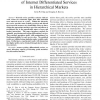Free Online Productivity Tools
i2Speak
i2Symbol
i2OCR
iTex2Img
iWeb2Print
iWeb2Shot
i2Type
iPdf2Split
iPdf2Merge
i2Bopomofo
i2Arabic
i2Style
i2Image
i2PDF
iLatex2Rtf
Sci2ools
125
click to vote
ICN
2001
Springer
2001
Springer
Optimal Provisioning and Pricing of Internet Differentiated Services in Hierarchical Markets
Abstract— Network service providers contract with network owners for connection rights, then offer individual users network access at a price. Within this hierarchy, the service provider must carefully provision and allocate (price) network resources (e.g. bandwidth). However, determining the appropriate amount to provision and allocate is problematic due to the unpredictable nature of users and market interactions. This paper introduces methods for optimally provisioning and pricing differentiated services. These methods maximizes profit, while maintaining a low blocking probability for each service class. The analytical results are validated using simulation under variable conditions. Furthermore, experimental results will demonstrate that higher profits can be obtained through shorter connection contracts. Keywords— resource pricing, differentiated services, resource allocation, capacity provisioning, profit maximization, hierarchical markets
Computer Networks | ICN 2001 | Individual Users Network | Network Service Providers | Service Provider |
Related Content
| Added | 29 Jul 2010 |
| Updated | 29 Jul 2010 |
| Type | Conference |
| Year | 2001 |
| Where | ICN |
| Authors | Errin W. Fulp, Douglas S. Reeves |
Comments (0)

